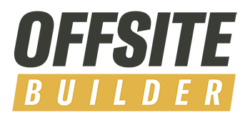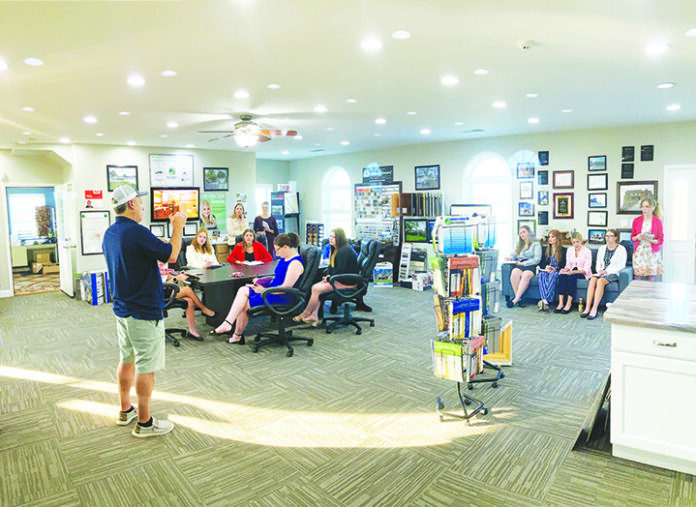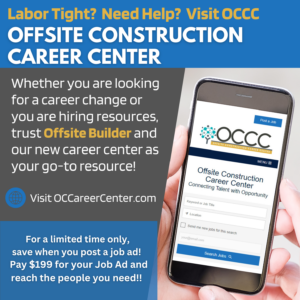How successful companies create and sustain effective brands
- All successful builders understand the benefits of a strong brand, but for modular builders it has additional payoffs.
- Some consumers are still skeptical about modular. Establishing yourself as a trustworthy professional withstanding in the community will go a long way towards overcoming that skepticism.
- The builders interviewed for this article actively promote their use of modular. Proactively educating consumers on its benefits has been a key to their success.
What’s in a brand and why should branding be important for modular builders? Why is your brand your most valuable asset? Three successful modular builders who have used branding as a centerpiece for their company — and reaped its rewards — weigh in.
Branding is the process of creating a distinct identity for a business in the mind of your target audience. It’s your equity in the marketplace. It includes your visual design (including colors and fonts), mission and personality. However, it’s more far-reaching than that.
If successful, your brand will leave a memorable impression on consumers and will let your customers know what to expect from your company. It will establish what you do and what you represent and will help customers make better choices.
Here are some things that a strong brand can do for you.
· Establish a memorable identity or impression of your company.
· Build credibility in the marketplace.
· Support your company’s mission and values.
· Generate new customers that are attracted to your brand.
· Create “forever customers”, retain previous customers, create referrals and foster repeat purchases.
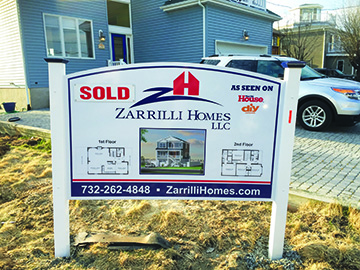
Courtesy of Zarrilli Homes
Breaking With Tradition
The story of your brand is meant to be told. Your brand isn’t necessarily about what makes you good. Instead, it’s about what makes you different from your competition. Your branding should be demonstrated and articulated throughout every facet of your business.
“Your name, your logo, everything you do conveys your brand; it is a reflection of you and your company,” says Anthony Zarrilli, who owns Zarrilli Modular Homes in Brick Township, New Jersey.
Zarrilli, a third-generation builder, broke with tradition and started a modular residential building business. He knew that even though his family name had recognition, he needed to be identified as something new and different. That’s when he began his branding process in a deliberate manner, starting with his company’s name and logo.
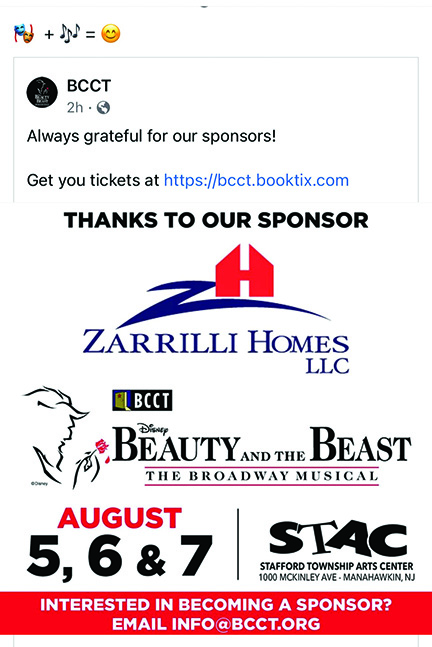
Courtesy of Zarrilli Homes.
Working with a third-party vendor to develop his logo, Zarrilli first completed a branding identity questionnaire. As arduous as he thought it was at the time, his goal was to articulate his brand dynamically and accurately, which helped set the tone for his modular building business and for what his customers can expect from him.
Showing a high level of professionalism allowed Zarrilli’s customers to identify with his brand, even though the building method was probably different than what they were used to.
“Many of my clients are professionals — lawyers, doctors, businesspeople — and for many, this is their second home,” Zarrilli says. “Our trucks are clean; our supervisors wear collared, logo shirts. Our clients come to us with high expectations, and we strive daily to attempt to live up to that and treat them in a professional manner, because that’s what they expect. This is the reason they came to us in the first place, and that is our brand.”
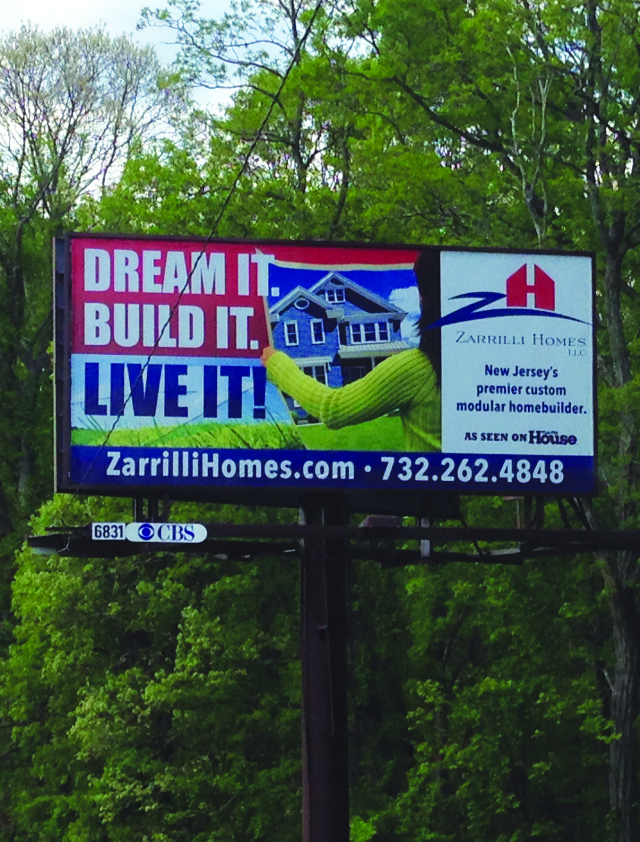
Courtesy of Zarrilli Homes.
Building Trust
Zarrilli’s experience is that a strong brand can overcome any reservations potential customers have about modular construction by reinforcing the builder’s trustworthiness.
“Our brand represents honesty, integrity and knowledge,” he says. These values are embodied throughout the company’s culture and in everything they do. “People need to know who they are dealing with from the moment of their first interaction with Zarrilli Homes.”
Zarrilli says he incorporates his logo wherever he can. “It is on my website and social media, but it’s also on yard signs, my trucks, Bobcats,” he says. “All my guys wear the apparel, and I give shirts to my set crews and contractors. They just like being affiliated with my brand and what it represents.”

Courtesy of Finish Werks
Commit to the Investment
The post-recession period between 2008 and 2012 was a milestone and a period of growth for Zarrilli and building his company’s brand. While most of the company’s site-built competitors were either cutting or eliminating their marketing budgets, Zarrilli recognized he needed to invest in branding and marketing.
What seemed like a counterintuitive decision resulted in substantial double-digit growth during those years. “My competition didn’t realize that there were still houses to be built out there,” Zarrilli says. “Because no one else was out there marketing their brand, it looked like I was the only game in town.”
Community Involvement
Whether it’s sponsoring a little league team or getting involved in Habitat for Humanity, contributing to your local community in an altruistic way adds to goodwill but is also a way to give back.
“It is an honor to support the local charities, youth groups, schools and nonprofit organizations such as the Brick Children’s Community Theatre, throughout Ocean and Monmouth counties,” says Zarrilli, who is active in his community’s chamber of commerce, children’s theater and many other local organizations.

Courtesy of Finish Werks
Define Your Niche
Harris Woodward, a builder and owner of Finish Werks of St. Laurel, Maryland, took his company through rebranding in 2007 and 2008.
At the time, Woodward says he saw buying preferences in the auto industry change as more consumers became concerned about the energy efficiency of vehicles being sold.
“If people were concerned about energy efficiency from a cost perspective on the second largest investment they will make in their lives – their vehicles – shouldn’t they have a similar attitude about their largest investment – their home?” Woodward thought to himself at the time.
After initially adopting a “green” approach to building, Woodward ultimately rebranded his company as the “High Performance Builder.” He detected a desire for demonstrable “pocketbook performance” with an emphasis on reduced energy and maintenance costs, and comfort versus the more esoteric, altruistic values of sustainability and carbon footprints.

Courtesy of Pine Ridge Homes.
To that end, Finish Werks’ mission is to “educate people on the value of performance,” Woodward says. He already knew he was a step ahead. As a modular builder, he was well aware of the intrinsic properties and tight envelope that a modular home provides, and he clearly communicates that message.
With every client, Woodward says he demonstrates how they can get an instant payoff through their utility bill by investing $10,000 to $15,000 upfront in energy efficient appliances, materials and techniques.
Woodward characterizes the approach as being “frank, friendly and logical” with his company’s tagline of “Truth in Building.” The Finish Werks’ website defines this as being truthful in accountability, performance and sustainability.
Be an Expert
Both Woodward and Zarrilli understand that the process of making modular mainstream includes getting more builders on board. Both are advocates of modular building systems and frequent speakers at industry events.
Zarrilli cannot recall the exact number, but he’s met dozens and dozens of builders over the years while speaking at events across the US, from Penn State University to the MHBA (Modular Home Builder Association). He also speaks regularly at municipal meetings, independent home inspector organizations, as well as to engineering and architectural groups in the New Jersey tri-state area.
Be Transparent
Kevin Satterthwaite, owner of Pine Ridge Homes in Vandalia and Benton, Illinois, offers a “direct and friendly” approach that has served him well over the last 25 years he has been building homes. With each interaction, Satterthwaite says he attempts to “build value and credibility through the education process” with his customers. “It’s never about price,” he adds. “It’s a soft sell. I try to communicate to my market in a voice that they will understand.”
A proponent of inbound marketing, Satterthwaite uses social media to communicate and educate his potential customers and extend his brand. With more than 6,000 followers on Facebook, transparency is a staple in Pine Ridge Homes’ posts.
Almost daily, Satterthwaite posts information about the modular building process, using photos of home foundations, homes being set and finished and then of the final product. With those posts and the Pine Ridge Homes website, Satterthwaite maintains a loyal customer base with substantial referral sales.
With these posts, he says he is adding value and strengthening his brand by helping to educate customers before they walk through his door.
While there’s not a one-size-fits-all approach to branding, Zarrilli says the important part is how you approach it. “It’s not one thing that makes a brand, but what you do, big and small, each and every day,” he says. “You, as a business owner, need to understand what you do, how to treat customers, what you put out there — advertising, website, finished homes — ultimately that becomes your brand. You have much more control than you think.”
Reed Dillon is a marketing consultant, freelance writer and owner of Creative Brand Content, in Moneta, Virginia.
